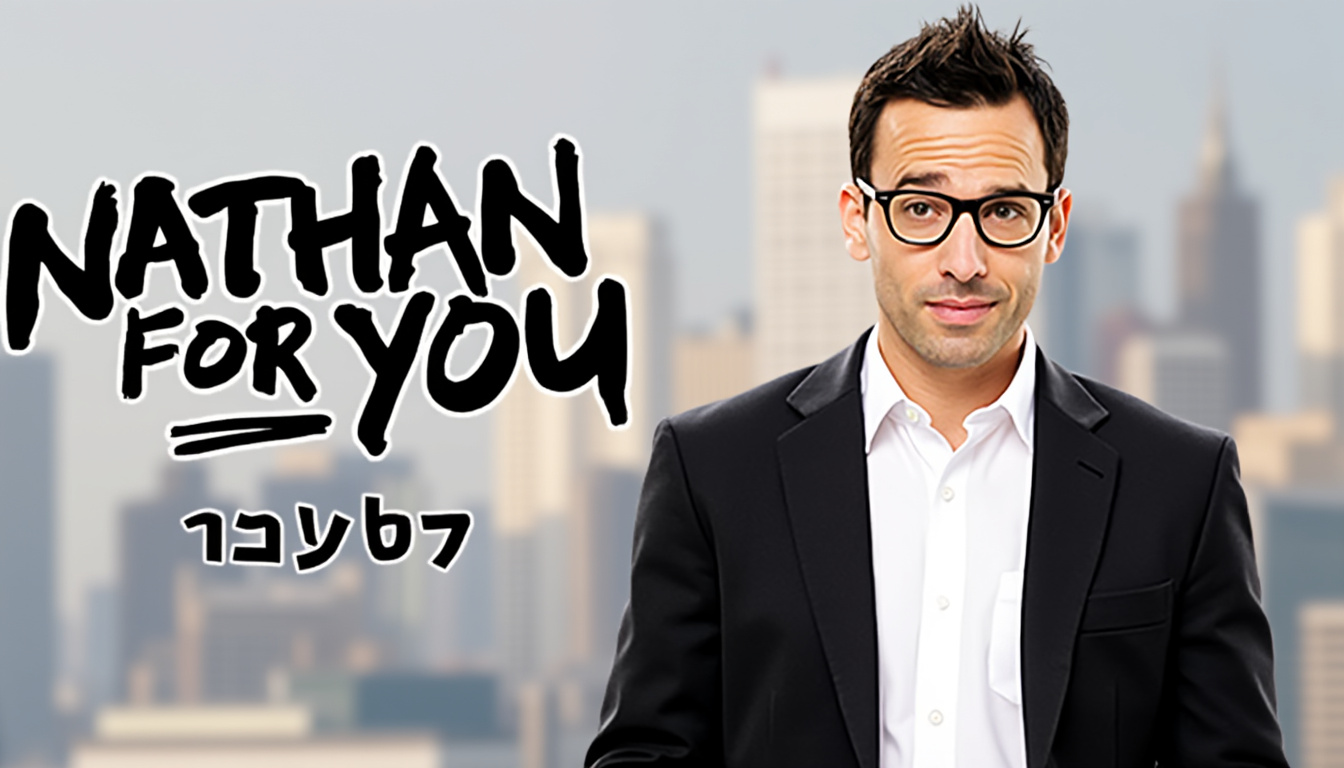Nathan Fielder is no stranger to controversy, especially in the realm of comedy where boundaries are continuously tested and stretched. In a recent episode of his HBO series, The Rehearsal, Fielder took aim at Paramount+ for their decision to remove an episode of his earlier show, Nathan for You. This situation has opened a dialogue about the sensitive nature of content in the current media landscape and the potential implications for creators and platforms alike. The pulled episode, filled with nuanced social commentary and a hilariously absurd concept, highlights not only Fielder’s distinctive comedic style but also the precarious line that streaming services tread in regard to audience sensibilities.
Nathan for You: A Satirical Exploration of Modern Marketing
Nathan for You, which originally aired on Comedy Central, is a series that showcases Fielder’s unique blend of sincerity and absurdity, portraying comedic scenarios that often push the limits of social decorum. Each episode typically focuses on a small business where Fielder offers outlandish solutions designed to improve their marketing and boost their sales. One standout episode, titled “Horseback Riding/Man Zone,” sought to further raise awareness about the Holocaust through the launch of a fictional outdoor apparel brand called Summit Ice.

This episode became particularly infamous due to its handling of sensitive topics, incorporating discussions about historical events into a comedic context. Fielder’s endeavor in the episode aimed to confront Holocaust denial while promoting a clothing line that he claimed was sourced from a morally responsible stance. Fielder’s approach has often sparked debate about the appropriateness of combining humor with such serious subjects, and it’s this particular blending of genres that has set him apart in the comedy arena.
The Mock Response: A Comic Retelling of Real-Life Events
During the recent installment of The Rehearsal, Fielder expertly staged a reenactment of his actual reaction to the episode’s removal. By inviting actor Alexander Leiss, who previously played “Fake Nathan,” to portray himself in drafting a fictional email to Paramount+, Fielder delivered humor while simultaneously addressing the contentious issue at hand. Through voiceovers and caricature, he explained, “I wrote an email to some contacts I had at Paramount, asking them why the episode was removed,” laying the groundwork for a discussion about creative boundaries and corporate policies.
Fielder cleverly juxtaposes the absurdity of the email’s content and its real-world implications. He made it known that the sensitivity surrounding the issue had an impact on his ability to communicate freely. His hypothetical correspondence tackled the idea that his ongoing project with Paramount+ — a scripted drama yet to be renewed — complicated how he could express concerns about censorship due to fear of repercussions. Thus, Fielder deftly combined a humorous approach with a serious critique of the industry’s challenges.
Why Was the Episode Removed? A Closer Look
Ultimately, Paramount+ admitted to pulling the third episode from Nathan for You due to “sensitivities” surrounding antisemitism, directly linked to the current atmosphere of heightened tensions following the ongoing Israel-Hamas conflict. Paramount+ expressed that their decision was largely influenced by their German division, which illustrated discomfort with the original episode’s humor in light of recent events.
The removal of such an episode raises questions about artistic expression versus corporate responsibility, particularly in an era where streaming platforms are continuously evolving. With the influx of platforms such as Netflix, Amazon Prime Video, and FX Networks, the competition necessitates careful consideration of content sensitivities. The decision to censor content due to contemporary social issues speaks volumes about the challenges that come with navigating public opinion while satisfying creative freedom. Fielder’s work exemplifies how comedy can be a powerful vessel for commentary, even when it sparks controversy.
| Aspect | Nathan for You | Episode Removed from the Series |
|---|---|---|
| Title | Nathan for You | Horseback Riding / Man Zone |
| Theme | Marketing issues with absurd solutions | Awareness for Holocaust |
| Removal Reason | N/A | Corporate sensitivities regarding antisemitism |
| Network at Launch | Comedy Central | Paramount+ |
| Comedy Style | Sarcastic and Satirical | Controversial Humor |
The Impact of Sensitivity on Artistic Expression
In an age where social consciousness is a dominant part of cultural dialogue, the implications of Paramount+‘s choice resonate beyond Fielder’s personal narrative. Censorship in creative spaces sparks debates about the fine line between sensitivity and censorship, drawing attention to the challenges of producing comedy that tackles serious topics. While content creators are encouraged to explore taboo or polarizing subjects, the backlash that may follow can lead to significant adjustments in how stories are told.

Some argue that censorship is necessary for protecting vulnerable communities and maintaining respect for tragic historical events. Others, however, posit that such restrictions stifle creativity, a sentiment echoed by many in comedic circles. The dynamic within which creators like Nathan Fielder operate has transformed, leaving many wondering: Can comedy still effectively address profound issues without facing backlash in a world where new sensibilities arise daily?
The Rehearsal: A Platform for Reflection
The innovative format of The Rehearsal puts Fielder’s creativity front and center while allowing audiences to reflect deeply on social issues. The show often utilizes layers of meta-narrative, blending reality with fiction, and intentionally blurring lines to spark discourse about morality, empathy, and human behavior. Such experimentation with the medium challenges audiences to engage with taboo subjects in a way that’s personal yet distanced, creating an environment ripe for introspection.
- Provocative Humor: Fielder’s use of comedy forces engagement with heavy topics.
- Exploration of Consequences: The impact of actions on individuals and communities is scrutinized.
- Dual Narration: Conflict between creators’ intentions and audience perceptions creates rich dialogue.
A general takeaway from both Fielder’s satire and corporate responses is the need for continuous dialogue about ethics in creative works. Fielder’s critique, paired with the broader industry conversation, emphasizes the importance of finding balance in comedic storytelling while addressing significant matters of our time.
Future Implications for Content Creation
The removal of an episode will naturally raise bigger questions for other content creators across varying platforms such as Adult Swim, especially given the ongoing ramifications of cancel culture. How industries respond to sensitive topics through their programming directly impacts public discourse and trust economics—critically impacting their overall reception. The implications for creators are profound. They must now consider not just artistic expression but also audience reaction and potential backlash.
Navigating Controversy in a Modern Media Landscape
Uncovering the ways that platforms can navigate controversy is of utmost importance, especially as creators strive to voice dissent against societal issues. Through collaborative dialogue between creators and platforms, policies can be co-developed resulting in better timeframes for creative exploration. As content continues to reflect ever-evolving societal norms, business models will inevitably change as well.
- Feedback Mechanisms: Direct audience engagement can inform content creation.
- Policy Adjustments: Adapting to audience sensitivities while remaining true to creator visions.
- Industry Standards: Establishing protocols for dealing with controversial material.
As creators like Nathan Fielder continue to produce thought-provoking content, they must remain vigilant about how societal contexts dictate the reception of their works. The resulting tasks become both an art form and an exercise in diplomacy, showcasing the evolving nature of comedy in our diverse landscape.
| Potential Responses to Content Sensitivity | Creative Intent | Corporate Policy |
|---|---|---|
| Remain Authentic | Pursue honest, genuine storytelling | Adapt to audience feedback during production |
| Engage in Dialogue | Explore discomfort through humor | Establish ethical guidelines for sensitive issues |
| Educate Audiences | Help audiences contextualize content | Offer transparency in content creation decisions |
| Innovate Formats | Experiment with storytelling techniques | Utilize platform strengths while acknowledging limitations |
The Broader Cultural Conversation
The feud between Nathan Fielder and Paramount+ over the removal of an episode encapsulates a much larger dialogue surrounding the role of comedy in confronting socio-political issues. Content like The Rehearsal demonstrates how art can challenge viewers to grapple with unsettling realities while providing humor as a tool for reflection. This juxtaposition allows audiences to engage with difficult discussions about antisemitism, historical context, and the ethics of representation in the media.
As this discourse evolves, it remains paramount for creators and consumers alike to ponder how artistic expression plays a part in social change. Future challenges will likely emerge, not only for beloved figures like Fielder but for the entire entertainment industry. Questioning the intersection of art and activism starts a multi-dimensional exploration into what makes for responsible, impactful storytelling amidst potent cultural sensitivities.
Engaging with Current Events
Fielder’s unflinching approach to sensitive topics invites the audience to reflect on the state of society’s relationship with humor. On a broader scale, comedy artists increasingly find themselves responsible for the dialogues that unfold from their art—contributing to much-needed conversations around pressing issues. The challenge then becomes elevating humor while maintaining respect for collective traumas. Thus, as the industry progresses, the continued *”What can and cannot be joked about?”* question looms large.
- Artistic Responsibility: Balancing the right to create with the need for sensitivity.
- Viewer Reception: Gauging audience perspectives on sensitive humor can build a robust community.
- Contemporary Relevance: Creating content that resonates while fostering conversation remains pivotal.
Navigating the evolving relationship between humor and societal awareness is a task that not only falls upon creators, such as Fielder, but also demands engagement from viewers who contribute to the context of comedic art. As the landscape continues changing, the balance between genuine expression and societal expectations must persistently recalibrate, promising an enduring conversation for years to come.


